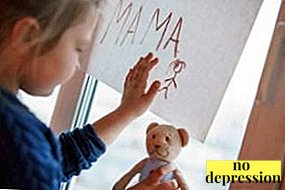The problem of deprivation is given great importance in psychology.
A similar condition leads to a series of negative behaviors children.
The essence of the concept

Under deprivation refers to the partial or complete lack of ability to meet existing psycho-physiological or social needs.
Similar term widespread in the middle of the 20th centurywhen after the end of World War II, a huge number of orphans remained.
Scientists have noticed that devoid of maternal affection and care children demonstrate a serious lag in their physiological, intellectual, and psychological development. Infants left without mothers often died.
In modern science deprivation is considered in the context of the emergence of a negative mental state due to the lack of satisfaction of important needs for a long time.
A similar condition can be observed in people at any age, but most often psychologists consider it is deprivation in children.
This is due a number of features of childhood:
- a large number of needs;
- the impossibility of self-solving problems;
- negative impact of negative factors on development.

A child has the same social and psychological needs as an adult: communication, caress, attention, recognition, etc.
But an adult, a formed person is able to overcome the problems of will and find a way out.
Children are not able to cope with a critical situation on their own, with serious consequences in the future.
In psychology, there is a term "Maternal deprivation". This is a situation where there is a lack of communication with the mother - a key aspect of human socialization.
It is not only about the actual loss of the mother as a result of her death, but also about the long or permanent separation.
Kinds
Deprivation is classified according to various criteria. Thus, according to the content, the following forms of it are divided:
- Sensory. This lack of standard physiological sensations: hugs, kisses, caresses. A simple lack of physical contact can lead to serious consequences. Some children can compensate for bodily deficiency by striving for close contact with unfamiliar or unfamiliar people (in adulthood this manifests itself in promiscuity of sexual contacts), while others aggressively shield themselves from people as a kind of protest.
- Cognitive. Lack of reliable information about important components of life in society. Such a lack of knowledge forces one to constantly think out, fantasize, imagine various images of phenomena of interest.
Children growing up outside the family can come up with plots of family life that will have little in common with reality.
- Emotional. The inability to receive those emotional experiences in which there is a need: love, friendship, trust, kindness, etc. Emotional deprivation in the future is manifested in coldness, poverty of emotions, distrust of the world. There is an inability to create a close emotional connection with another person.
- Spiritual. A person loses sources of spiritual development and cannot satisfy his respective needs, this leads to a serious mental crisis.
- Social. This is a limitation of the ability to play a relevant social role, to occupy a place in society and to feel recognition from other people. Social deprivation for young children is manifested in the unmet need for parents, who are the foundation of the world around them. The main social roles in the future: family member, student, friend.
Unrealized in these areas leads to serious violations of the process of socialization of the individual.


The duration of deprivation is divided into:
- Short term. For example, a child as a punishment is not allowed to walk in the yard with peers for a week, restricting his right to communicate.
- Lingering. The mother goes abroad for a long time and the daughter or son remains without her attention.
- Long term. The presence of children in state-run orphanages until the age of majority and the continuation of adult life without the presence of a number of parents.
Examples
Child deprivation manifests itself in the following situations.:
- a postpartum period in which the mother does not immediately get access to the newborn;
- long parent departure;
- the constant presence of a number of strangers or insignificant people, replacing each other (nanny, housekeeper, grandmother);
- systematic staying away from home for a long time (living with relatives, in boarding schools, in camps, etc.);
- being in kindergartens in the absence of psychological readiness for this;
- independent stay in the hospital;
- death of parents.

Features of the development of infants with maternal deprivation
Newborns at the natural level have a strong need for maternal attention. This is explained not only by physiological features, but also by their emotional development.
The discomfort of separation from the mother can manifest itself as follows:
- Somatic disorders: insomnia, vomiting, constipation, diarrhea.
- Development disorders: lack of emotional interest and desire for communication, problems with the further development of speech.
- Motor disorders: insufficient motor activity, inhibited reactions.
- Mental disorders: agitation or passivity, phobias, etc.

Contrary to popular belief, problems of infancy not necessarily reflected in the later life of people.
A child who has experienced a period of deprivation in infancy can get into favorable conditions and get an opportunity to get rid of existing disorders.
In this case possible complete change of behavior personality and the lack of development of pathologies in the future.
But the continuity of negative processes flowing from infancy to childhood and adolescence, and then into adulthood, is not excluded.
Impact on mental development and behavior
Psychic deprivation is expressed in a child in the appearance of disorders at different levels of development of consciousness. Sensory disturbances they manifest themselves in aggression, as in the way of protecting their personal space from other people, or in constant unsupervised bodily contacts with outsiders.
Cognitive problems lead to a distorted perception of reality and the construction of erroneous models of the world. At the emotional level, difficulties arise with establishing trusting contacts with someone.

From a social point of view, there is no ability to identify oneself with social roles approved in society.
Similar psychological problems lead to behavioral disorderswhich often acquires a deviant character.
Personality portrait
Typical traits - fearfulness, distrust, suspicion of the world around. Difficulties arise when entering into contacts with strangers, maintaining communication is hard.
Deprivation in orphans, as in the most vulnerable category, is often manifested by a complex of various mental problems. These can be both individual deviations of behavior from the norm existing in society, and serious violations of the development of the intellect and character.
Children under deprivation experiencing constant psychological discomfort due to lack of physical, emotional, emotional contacts.
They often sleep poorly, demonstrate affective instability, show excessive anxiety, cannot fully control their behavior.
Such children often in their imagination build "Catastrophic models of the world". It seems to them that nothing good can happen in life, that they are surrounded only by injustice and cruelty.

As a result, there are serious problems with establishing trusting relationships with others, with building a family in the future.
This is due to the desire protect yourself from the pain of betrayal, from possible losses.
Internal experiences lead to the projection of their negative attitude to the world on others.
The child is confident that everyone is against him and want to harm him. Often there is a misinterpretation of the interlocutor mimicry, his gestures and words.
It should be noted that the portrait of the person strongly depends on the characteristics of the nervous system, the level of injury, the presence of compensating effects (the emergence of other objects of attachment).
By creating the appropriate conditions, you can completely eliminate the deprivation manifestations of the child, which will allow him to competently build his own life in the future.
Assistance Methods
There are standard tricks that help to overcome existing problems and ensure its success in modern society.
Help is provided by social educators and psychologists who conduct observation, questioning, testing.
Based on the data obtained, the directions of work are identified. Conducted talks, trainings. With the help of consultations, exercises are often obtained. achieve behavior adjustment.
Work on the overall development and expansion of horizons, labor education and individual approach - all this standard directions activities of educators, social educators and psychologists.

Psychological and pedagogical assistance helps children learn the following aspects of life in society:
- respect for work;
- ideas of elementary norms of morality, honor, dignity, decency;
- standard behaviors appropriate to specific social situations;
- the ability to make an informed choice;
- universal activity skills;
- ability to build relationships with other people;
- ability to work in a team.
Children's deprivation is a serious problem, which can adversely affect the whole subsequent life of a person.
Timely professional assistance of social teachers and psychologists helps to significantly adjust the development of the child.
What is maternal deprivation? Find out about this from the video:



